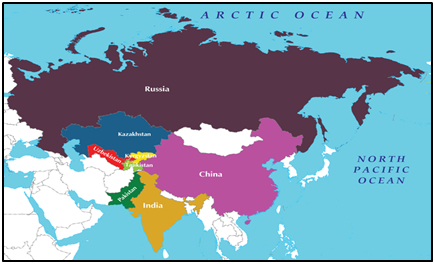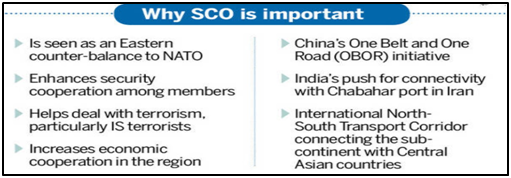Why in News?
- Recently, the meeting of the Foreign Ministers of the Shanghai Cooperation Organization (SCO) took place in Goa.
- India is holding the chairmanship of the SCO for the year 2023.
What’s in today’s article?
- About SCO (History, Objectives, Organisation Structure, Member Countries, etc.)
About Shanghai Cooperation Organisation (SCO):
- The Shanghai Cooperation Organisation is a permanent intergovernmental international organisation, established in 2001.
- It is built on the foundation laid by the Shanghai Five grouping of Russia, China, Kazakhstan, Kyrgyzstan and Tajikistan.
- The five countries had come together to work on regional security, reduction of border troops, and terrorism in the post-Soviet era in 1996.
- In 2001, the “Shanghai Five” inducted Uzbekistan into the group and named it the SCO, outlining its principles in a charter that promoted what was called the “Shanghai spirit” of cooperation.
Objectives of SCO:
- To strengthen mutual trust and neighbourliness among the member states
- To promote effective cooperation in politics, trade & economy, research &technology and culture
- To enhance ties in education, energy, transport, tourism, environmental protection, etc.
- To maintain and ensure peace, security and stability in the region
- To establish a democratic, fair and rational new international political & economic order
Organisational Structure of SCO:
- The Heads of State Council (HSC) is the supreme decision-making body in the SCO, it meets once a year.
- The Council of Heads of Government is the second-highest council in the organisation.
- The Council of Foreign Ministers hold regular meetings, where they discuss the current international situation.
- Regional Anti-Terrorist Structure (RATS), based in Tashkent, is established to combat terrorism, separatism and extremism.
- Official working languages: Chinese, Russian
- SCO Secretariat: Beijing, China
Member Countries of SCO:

- 8 member states– China, Kazakhstan, Kyrgyzstan, Russia, Tajikistan, Uzbekistan, India, Pakistan.
- India and Pakistan became full members at the Heads of State Council meet in Astana in 2017.
- Iran will be the newest member (9th) of the SCO, when it joins the forum in 2023 under the chairmanship of India.
- 4 Observer members – Afghanistan, Belarus, Iran, Mongolia
- In 2021, the procedure of granting Iran the status of Member State was started at the SCO Summit in Dushanbe.
- In 2022, a similar procedure was launched for Belarus at the SCO Summit in Samarkand
- 9 Dialogue Partners – Azerbaijan, Armenia, Egypt, Cambodia, Qatar, Nepal, Saudi Arabia, Turkey, and Sri Lanka.
- In 2022, the procedure for granting the status of Dialogue Partners to Bahrain, Kuwait, Maldives, Myanmar and the United Arab Emirates was initiated at the SCO Summit in Samarkand.
Significance of SCO

Significance of SCO for India
- India’s security, geopolitical, strategic and economic interests are closely intertwined with developments in the region
- The Regional Anti-Terrorism Structure (RATS) of SCO specifically deals with issues relating to security and defence.
- The Central Asian region is richly endowed with natural resources and vital minerals
- SCO provides a platform for India’s efforts to connect with Central Asia.
- Stable Afghanistan is in India’s interest. SCO is a platform which can play an important role in Afghanistan.









